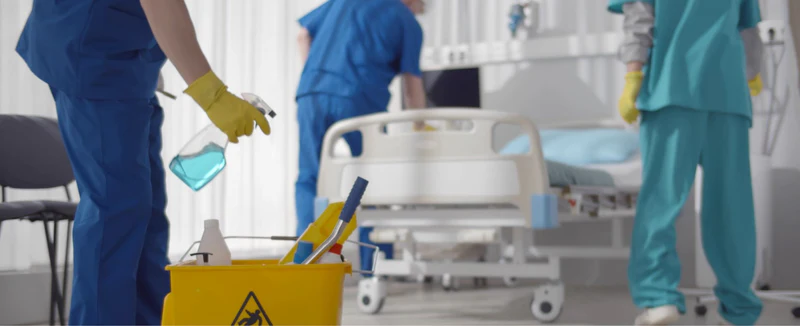Jun
05
2025

Housekeeping plays a crucial role in healthcare facilities, ensuring cleanliness, hygiene, and infection control. A well-maintained healthcare environment reduces the risk of hospital-acquired infections (HAIs), enhances patient recovery, and maintains regulatory compliance. However, healthcare housekeeping comes with unique challenges, including infection control, staff shortages, biohazard disposal, and compliance with hygiene protocols.
At Arvyna Integrated Solutions, we specialize in facility management services, including hospital housekeeping solutions that ensure a safe and hygienic environment for patients and staff. In this blog, we will discuss key challenges in healthcare housekeeping and their practical solutions.
Major Challenges in Housekeeping in Healthcare Facilities
1. Infection Control & Prevention
🔹 Challenge:
Hospitals are high-risk zones for infections, and improper cleaning can lead to the spread of bacteria, viruses, and pathogens. Common hospital-acquired infections (HAIs) include MRSA, Clostridium difficile (C. diff), and COVID-19.
🔹 Solution:
✔ Use hospital-grade disinfectants and follow standard cleaning protocols.
✔ Implement a color-coded cleaning system to prevent cross-contamination.
✔ Train housekeeping staff in infection control techniques and proper hand hygiene.
✔ Regular disinfection of high-touch surfaces like doorknobs, bed rails, and medical equipment.
📌 Industry Example:
🏥 In a hospital ICU, cleaning staff use separate mops and disinfectants for different areas to prevent cross-contamination.
2. Managing Biohazard & Medical Waste Disposal
🔹 Challenge:
Improper handling of biohazardous waste (blood, body fluids, used syringes, and medical supplies) can pose serious health risks to patients and staff.
🔹 Solution:
✔ Implement a strict waste segregation policy for hazardous, infectious, and general waste.
✔ Use color-coded bins for different waste types (e.g., red for biohazard, yellow for infectious waste).
✔ Train housekeeping staff on proper waste handling, disposal, and use of PPE (gloves, masks, aprons).
✔ Schedule regular waste disposal by certified medical waste management companies.
📌 Industry Example:
🏨 Hospitals use sealed containers for sharp waste (needles, blades) to prevent accidental injuries and infections.
3. Staff Shortages & High Workload
🔹 Challenge:
Many healthcare facilities face a shortage of trained housekeeping staff, leading to overworked employees, lower cleaning efficiency, and increased risk of errors.
🔹 Solution:
✔ Optimize workforce management by using AI-based scheduling tools.
✔ Offer competitive salaries and training programs to attract skilled housekeeping professionals.
✔ Use robotic cleaning systems and automated floor scrubbers to reduce manual workload.
✔ Train staff on time management and efficient cleaning techniques to maximize productivity.
📌 Industry Example:
🏥 Some hospitals use robotic cleaners for floor disinfection, reducing staff workload while maintaining hygiene.
4. Compliance with Health & Safety Regulations
🔹 Challenge:
Healthcare housekeeping must comply with strict safety and hygiene regulations set by organizations like:
✔ World Health Organization (WHO)
✔ Occupational Safety and Health Administration (OSHA)
✔ National Accreditation Board for Hospitals & Healthcare Providers (NABH)
Failure to meet compliance standards can result in penalties, lawsuits, and reputational damage.
🔹 Solution:
✔ Regular training sessions on hygiene protocols and safety measures for housekeeping staff.
✔ Implement automated compliance tracking to ensure adherence to standards.
✔ Conduct frequent audits and quality control checks on cleanliness levels.
📌 Industry Example:
🏨 Leading hospitals use digital compliance tracking to monitor and report hygiene standards in real-time.
5. Handling Chemical & Cleaning Supply Safety
🔹 Challenge:
Housekeeping staff work with strong disinfectants, bleach, and cleaning chemicals that can cause skin allergies, respiratory issues, and accidental spills.
🔹 Solution:
✔ Use eco-friendly, non-toxic cleaning agents wherever possible.
✔ Provide Personal Protective Equipment (PPE) like gloves, masks, and goggles.
✔ Train staff on chemical handling procedures, emergency protocols, and spill management.
✔ Store chemicals in well-ventilated, labeled storage areas.
📌 Industry Example:
🏥 Hospitals adopt eco-friendly, non-toxic cleaning solutions to minimize chemical exposure risks.
6. Maintaining Cleanliness in High-Traffic Areas
🔹 Challenge:
Areas like waiting rooms, emergency departments, and ICUs experience high foot traffic, making it difficult to maintain constant cleanliness.
🔹 Solution:
✔ Implement real-time monitoring systems for housekeeping staff to clean high-traffic zones more frequently.
✔ Use automated UV light disinfection systems in ICUs and operating rooms.
✔ Place hand sanitizers and automatic air purifiers in waiting areas.
📌 Industry Example:
🏨 Hospitals use UV-based disinfection in operating theaters to eliminate airborne pathogens.
7. Patient Sensitivity & Privacy Concerns
🔹 Challenge:
Housekeeping staff must clean patient rooms, ICUs, and operation theaters while maintaining patient comfort and privacy.
🔹 Solution:
✔ Train housekeeping staff in patient communication and bedside etiquette.
✔ Use low-noise cleaning equipment to avoid disturbing patients.
✔ Follow strict privacy protocols to respect patient confidentiality.
📌 Industry Example:
🏥 Housekeeping teams schedule cleaning during non-critical hours to avoid disrupting patient rest.
8. Emergency Cleaning for Accidents & Spills
🔹 Challenge:
Hospitals frequently deal with unexpected spills, bloodstains, and bodily fluid cleanups, requiring immediate attention to prevent infections.
🔹 Solution:
✔ Equip staff with emergency spill kits for quick response.
✔ Train housekeeping personnel in hazardous material cleanup.
✔ Use specialized cleaning solutions for biohazard spills.
📌 Industry Example:
🏨 ICUs and emergency rooms have dedicated rapid-response cleaning teams for quick cleanup of spills.
Future of Housekeeping in Healthcare
The healthcare industry is evolving, and housekeeping practices are advancing with new technologies and improved standards. The future of hospital housekeeping will include:
✔ AI-powered cleaning schedules for better efficiency.
✔ Robotics & automation for contactless cleaning.
✔ Eco-friendly cleaning solutions for sustainability.
✔ Advanced infection control technologies, including UV disinfection and smart air filtration systems.
At Arvyna Integrated Solutions, we integrate technology-driven facility management solutions to enhance healthcare housekeeping efficiency, safety, and hygiene.
Conclusion
Healthcare housekeeping is a critical component of patient care that ensures infection control, waste management, and compliance with hygiene standards. Despite the challenges of biohazard handling, staff shortages, and regulatory compliance, implementing advanced cleaning technologies, staff training, and automated processes can significantly improve efficiency.
At Arvyna Integrated Solutions, we provide expert healthcare facility management services to help hospitals maintain high hygiene standards and ensure a safe environment for patients and staff.
📢 Looking for expert housekeeping solutions in healthcare? Contact Arvyna Integrated Solutions today! 🚀
Back